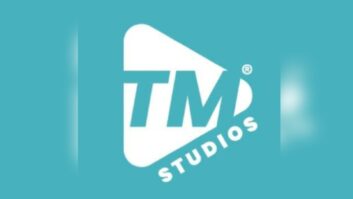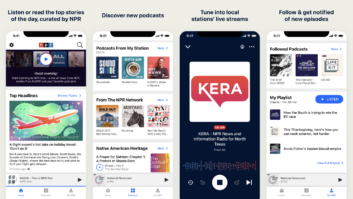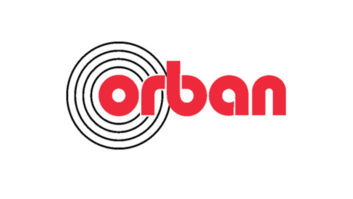
Mitch Glider with a rack that’s headed for Vancouver.
NEW YORK Mitch Glider and his team of broadcast engineers at Westwood One have spent months putting together a technical plan they believe is worthy of the world-class athletes the radio network will cover in Vancouver at the Winter Olympic games.
They hope their prep work will help the broadcast network deliver 17 consecutive days of flawless coverage.
However, one thing Glider, vice president of engineering at Westwood One, has learned from his work at previous Olympics is that telecom can be balky at times regardless of planning.
“ISDN, T1, the Internet, it all acts up when you least expect it and when you’re short on time to fix it,” Glider says. “Covering the Olympics is like managing one giant remote for over two weeks.”
Experience is an advantage for Westwood One, which has held the exclusive radio coverage rights dating to the 1988 Summer Olympics in Seoul, South Korea.
The company — which is one of the largest producers of radio programming in the United States and distributes the news operations of CBS Radio Network, CNN and NBC Radio — declined to release details about how many affiliates have cleared its Olympic coverage. Overall it serves some 7,500 stations with approximately 150 programs and is known for its coverage of live events including National Football League games.
Technical planning for the Vancouver Winter Games began in the fall, with input from Westwood One programmers including Howard Deneroff, vice president of sports.
The engineering staff “really can’t move forward until we know what the programming schedule is going to look like,” Glider said.
Westwood One plans to provide short-form updates to its affiliates three times an hour, 24 hours a day from Feb. 12–28, according to programmers. Long-form coverage will consist of two hours of wrap-up coverage, analysis and interviews each evening. John Tautges and Kevin Kugler will host the “Olympic Roundup.” In all, the radio network will send approximately a dozen announcers to Vancouver.
Play-by-play of some hockey games and live coverage of figure skating, speed skating and skiing also will be available to affiliates, network programmers said.
Efficient operation
Glider, who oversees broadcast and satellite uplink facilities at Westwood One, will not make the trip to Vancouver. The Westwood One technical department will send broadcast engineers Lenny Prosceo and Wally Tienken about a week in advance of the games; only one will stay for the duration. Producer Mike Eaby also will handle some technical duties.

Westwood One used several gutted studios at its broadcast center in New York to stage equipment for use in Vancouver. “It is a very expensive undertaking to cover the Olympics,” Glider said. “It’s expensive for international travel, for accommodations. We obviously have a budget to stay within and it’s pretty tight.” The United State Olympic Committee estimates costs of around $200 to $300 per day per person for lodging, meals and transportation for these games.
More than 4,000 TV, radio and online journalists are expected to call the International Broadcast Centre home during the Olympics. Westwood One will operate from studios in space leased in the NBC Television complex within the IBC.
The radio network will work from several small soundproof suites built to record short- and long-form sessions. A small bullpen area will include an audio workstation for editing pieces. A small control room also will be built.
Glider, who served as technical manager for Westwood One during the past two winter Olympics, began the Vancouver planning process by using Visio diagramming software to conceptualize and draw the broadcast studios the network will build.
“(Drawings) are done before anyone picks up a punch tool or wire stripper. Then we put together our gear setups. The emphasis around here is on pre-wiring.
“I’d rather our guys not have to wire anything on site. Less and less work is done at the site with each Olympics we broadcast.”
Armed with his scaled space drawings for the studios within the NBC Universal complex, Glider orders chairs, file cabinets, lamps and any other pieces of office equipment that Westwood One might need in its studios. Those requests are placed through NBC.
“The local host committee provides the space for us, but NBC handles all of the construction, electrical and telecom on site. We just pick, a la carte, the materials we need. Olympic Broadcasting Services Vancouver is the host broadcaster.” The International Olympic Committee created Olympic Broadcasting Services, beginning with the Beijing Summer Olympics in 2008, to serve as host broadcaster for future Olympic games.
Once the scope of facilities is determined, Glider next moves to the broadcast gear required for 17 days of 24/7 operations.
“We decide on consoles, routers, intercoms and the kinds of connectivity we want. We are going with ISDN in Vancouver, partly because of cost considerations. We then order any new equipment we might need.”
Cold weather in Vancouver, barring a blizzard or ice storm, does not concern Glider, who said previous winter Olympics have not presented many weather-related challenges to the equipment.
Staging
Westwood One, which is owned by private equity firm The Gores Radio Group, used several gutted studios at its broadcast center in New York City to stage the equipment going to Vancouver. The broadcast equipment was assembled in mid-December in an attempt to simulate an actual broadcast from Vancouver.
“Our approach is very modular. Everything is in the rack already. And nothing left New York before it was tested.
“Wally (Tienken) and Lenny (Prosceo) built all of the harnesses. Everything is pre-wired and color-coded. Then we packed it and shipped it,” Glider said.
A Sierra Automated Systems RIO routing system will be the backbone of the Vancouver operations at the IBC, Glider said. SAS integrated intercom and talkback systems will enable producers and talent to communicate between venues, the IBC and New York. Westwood One uses CDQ Prima 120 ISDN codecs.

Glider began the planning process by using Visio software to conceptualize and draw the broadcast studios the network will build in the International Broadcast Centre. “We’ve used the SAS 32KD router for previous Olympics but will use the SAS RIO in Vancouver. It’s a 32 x 32 router that is a stand-alone, a 32-square mono router. We’ll also be using four brand-new ICM-32 intercom heads.
“Overall, we’ll be taking less equipment this year than previous Olympics. The technology is such that we just don’t need as much gear. The overall reliability and flexibility of what we have has improved,” Glider said.
Broadcast positions at venues like BC Place Stadium, site of the opening and closing ceremonies, Richmond Olympic Oval and Whistler Mountain will be equipped with a four-wire system and an AEQ ISDN box with three headset plug-ins, a line-input level control and level control for IFB.
Westwood One will be provided raw natural sound from various venues, Glider said, and can integrate that into short- and long-form reports.
Glider said Westwood One’s studios at the IBC will feature Mackie 1604 mixers, Dixon NM-250 MKII newsroom mixers, Telos One phone hybrids and Lenovo T600 laptops. Reporters will carry Marantz PMD620 recorders with 4 GB of flash memory, Glider said.
Producers and reporters will share onsite editing duties working from the soundproof suites on laptops loaded with Adobe Audition digital audio editing software. Westwood One will not use wireless mic gear at this year’s games.
Olympic programming will be backhauled out of the International Broadcast Centre via ISDN to New York, where commercials will be inserted and the content sent along for traditional distribution to affiliates.
Company officials would not disclose what Westwood One paid for the radio rights to provide exclusive coverage of the 2010 Winter Olympic games.












